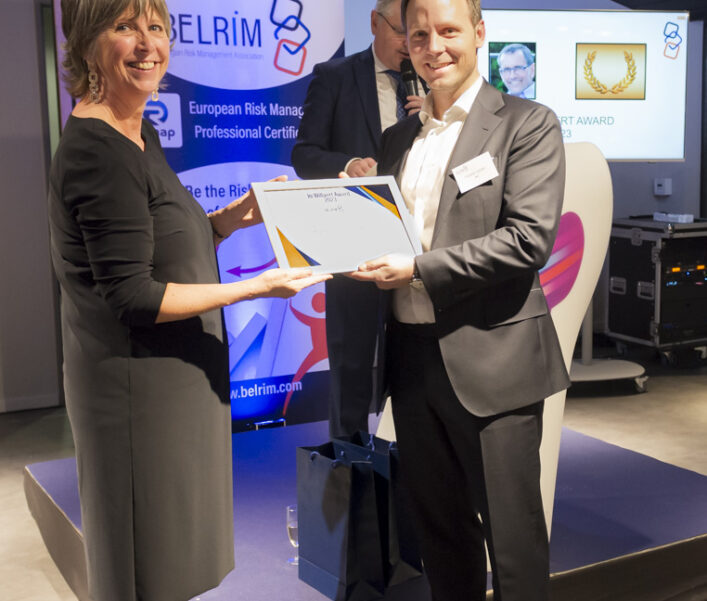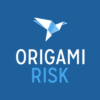What does winning the award actually mean to you? Were you expecting this?
Frédéric Lycops: First of all, it is quite an honour to win the award, especially as it is named after Jo Willaert who was a respected risk manager and, moreover, the award has only existed for two years. Getting it was a complete surprise. I was not expecting to be nominated, let alone that I would win it. And when eventually you hear your name being called out, you think immediately: oops, I haven’t prepared a speech. Besides, it is a source of inspiration for me to continue working on the development of Young BELRIM within the organisation. Thanks to the award, I will be able to open more doors for Young BELRIM and create additional brand awareness. In fact, I notice that since the award ceremony, many people have come up to me to talk about Young BELRIM.
What strengths do you think a winner should have?
Frédéric Lycops: The award is given to someone who goes the extra mile for risk management. It is very broad and there are no specific criteria to win the award. Being committed to a project like Young BELRIM, for example, is sufficient. Besides, not much experience is needed. In 2022, the award went to someone who had just developed the risk management function within her company. It is not necessarily experience that is needed, but rather the commitment to start rolling out risk management into the future.
What has been your role in developing that youth department at BELRIM?
Frédéric Lycops: I am certainly not the founder of Young BELRIM nor the idea. That honour does not belong to me. What I did help set up was to rename the Young Insurance movement that had come over from the Netherlands as Young BELRIM and to bring it under BELRIM, an organisation that already existed and had the necessary infrastructure. The idea of attracting young people had already been on my mind. Because we saw that the average age of members was rising and that there was actually a lack of younger talent within the organisation. Ultimately, we thought it would be a win-win situation to merge the two organisations and create something new under BELRIM’s mature organisation.
Why does risk management and the insurance industry in general struggle to attract and retain young talent?
Frédéric Lycops: I think there are a number of factors at play. On the one hand, there is an unjustified perception against the insurance sector and has an image of being stale, traditional, boring and bureaucratic. Unjustifiably so, by the way. A second factor is the sector’s technological lag while young people are very interested in technology. There is still a lot of catching up to do. On top of that, there is huge competition with other sectors such as media and entertainment, which are seen as more dynamic and collaborative and where the technological revolution is much more visible. Thirdly, young people assume that the opportunities offered by careers within insurance are limited. Of course, this is not true at all because insurance touches a lot of components within society. So it will come down to putting the sector in a better light.
Is the insurance sector really still as corny as is thought?
Frédéric Lycops: The risk landscape is not at all the same as it was decades ago. Today it is less about tangible objects to be insured but much more about intangible assets such as insuring cyber risks. And in order to grasp exactly what those risks entail, I think young people are perfectly placed to shine a new light on that. Because to be able to insure something, of course, you also need to understand what those factors are.
How did you learn about BELRIM and since when have you been a member?
Frédéric Lycops: I entered the industry in 2008 when I joined a large international industrial insurance broker. In the years that followed, I heard a lot about BELRIM but nevertheless did not immediately become a member. Around 2012, so a good four years after my first introduction to the organisation, I took the plunge anyway. Back then, BELRIM did not have many young members. As I mentioned in my acceptance speech, I was one of the youngest members for many years and I am happy to see that more and more young people have joined and the organisation is actively attracting young members. That evolution is great to see and I was able to witness it from the beginning.
And what do you think is the added value of being a Belrim member?
Frédéric Lycops: There are different types of members like the risk managers, the service providers like experts or lawyers, for example, and then there are also the academic members. And there are specific benefits for everyone. But overall, the networking aspect is the biggest positive, as is the sharing of knowledge among like-minded people. And for the companies themselves, the listening ear is important so they can pick up on the needs of the industrial world and risk managers. So they can change their services and adapt their products according to the needs at hand.
You are employed at AIG. What is your function within AIG?
Frédéric Lycops: As Head of Client & Broker Engagement, I am ultimately responsible for broker and client relationships in Belgium and Luxembourg. Together with my team, I make sure that cooperation runs smoothly and that our brokers and clients have access to the different people and departments within AIG and are aware of the products and services. I have to make sure brokers are happy and that everything runs smoothly because as AIG we rely on business brought in by brokers, consultants and intermediaries. I also have to help ensure that our products are still in tune with the needs that they translate to us and that they hear in the market. In addition, my role also involves ensuring AIG’s visibility within the market and making sure our products and services are known within the world of risk management.
And what is it like to work at such a large group?
Frédéric Lycops: I have been working at AIG for six months now but have previously worked for US multinationals as well, so the culture and way of working are not new. It is a familiar environment and it is nice to be able to work in an international setting, with multiple cultures and nationalities. It is also pleasant to be able to operate in a well-structured environment, where there is a lot of knowledge. Whether you’re talking about climate change, IT-risks,… each area has specialists in-house. And it is also a bit my role to start connecting all those knowledge points and bring them together to clients and brokers.
What has your career looked like so far? Has it always been your choice to work in the insurance sector?
Frédéric Lycops: As I mentioned earlier, I started my professional career in 2008 in the corporate insurance brokerage industry. In 2012, I switched to the client side, at FedEx as the person responsible for risk management for EMEA, a position I held for a little over eight years. I then had the opportunity to head the corporate risk management function at a over to a Belgian listed company., And since mid-2023, I have joined AIG to work on the insurer side. Indeed, my career has come full circle: starting as a broker, then transitioning to the client side, and now working within the insurance market. However, I think there are still a lot of things I can do. Indeed, becoming active in the insurance sector is always a conscious choice; even as a student, I already knew what I was going to do. When one starts studies, one often has to make choices between sciences, economics the mathematical or legal. Insurance touches all those disciplines and is a perfect mix. That beautiful mixture, of all those disciplines, makes it beautiful but also so complicated.
And what is your personal ambition for the coming years?
Frédéric Lycops: I am working for an insurance company myself for the first time. And thanks to my experience, I am fortunate to have a unique view and a different angle because I had a chance to work on the client side. I can help steer what customers and brokers are looking for in terms of services and products and that is surely a unique position within an insurer to be able to fulfil. In short, what I would like to do is shape a new kind of dynamic within AIG and be close to customers and brokers with the group. At this point in my career, with my experience, I find the position I have now very interesting: it is actually a dream position. As a client and broker, I used to be sometimes annoyed with insurers, now I can do my bit to change things in the positive direction myself.
In our conversation, you use risk management and insurance interchangeably. Is there actually a substantial difference between the two?
Frédéric Lycops: That’s a very good question. There is definitely a difference, but the two are ultimately very closely related. Let me illustrate that. Without even realizing it, in everyday life, we all apply risk management principles. It is no different for you than it is for me. When we get into our car, we instinctively conduct a risk assessment and implement risk mitigation strategies. We look left and right, put on our seat belts, obey speed limits: these are all things we do to reduce risk. And for the residual risk, if something did happen, we still have insurance to fall back on. So that insurance is only a small part within risk management. Insurance is only the capstone in a whole cycle of risk management. If we specifically want to manage risks, we will first analyse and map them. Then we will see what we can do to mitigate them. And once these have been reduced as much as possible, we can start settling the residual risk, which remains, on the insurance market. So insurance, at least for companies, is a way of selling a residual risk to the market. And this residual risk is getting smaller and smaller. Because the industry and companies are doing more and more to reduce risks themselves, which is obviously more financially advantageous.
What impact do you think the technological revolution will have on the industry?
Frédéric Lycops: I think that the technological evolution will have an impact on the insurance sector in two ways: on the one hand, on the way of working within the sector itself, and on the other hand, on risks. Because, as I mentioned, the risk landscape has changed a lot. It is less and less about tangible assets and more and more about intellectual property and that requires a very different way of dealing with risks, covering them and finding solutions. If one has a physical property, it is easy to put a value on it. On an intellectual property, the situation is different and it is much more intangible which makes it harder to put a value on it. In other words, it makes it more difficult to insure.
What are the industry’s main challenges today?
Frédéric Lycops: I think mainly about artificial intelligence. It’s actually shocking how fast this is going and I don’t think we can grasp right now what the impact will be within the insurance sector. It is a very sedentary discipline so it can be perfectly taken by robotisation and AI. I assume that many of the models we are currently developing ourselves will all be adopted and a lot will be automated. And it will all be much faster to be able to map those. Another big challenge I see and take away from conversations with risk managers, consultants and brokers is that insurance products are no longer fit-for-purpose or don’t quite cover the connotations of the risks that manifest for companies. And that the capitals in return are completely inadequate for the scale of claims. I am thinking of climate and cyber risks in particular. The capitals involved in these are completely insufficient to cover the full landscape of risks. On top of that, the big challenge for the industry is to keep reinventing and evolving and not to fall behind and become irrelevant.








